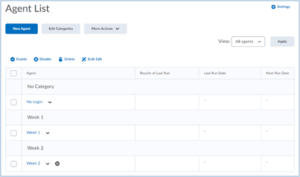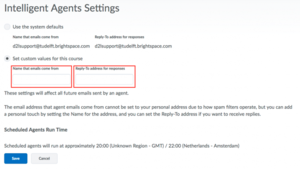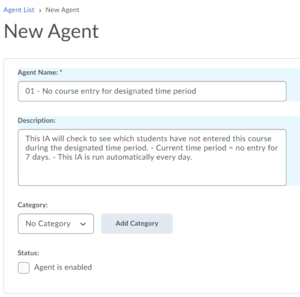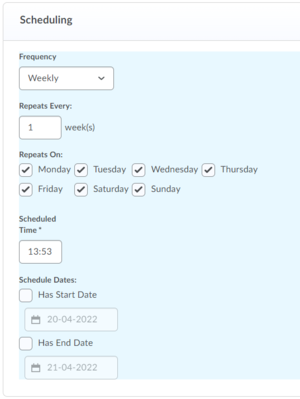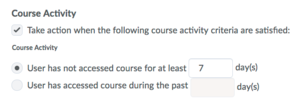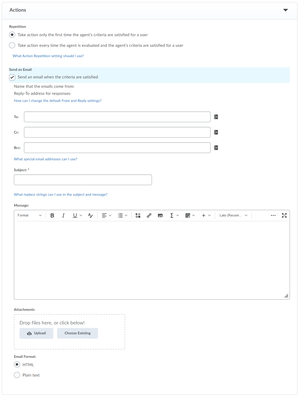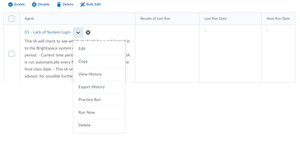Automate e-mail with Intelligent Agents
Intelligent Agents is an automated email notification feature designed to assist you when a defined activity occurs in a course or when there is a lack of login or course entry. Intelligent Agents can be used to make personalised communication more efficient.
This page is sectioned into three parts:
- Settings and setup
- Use cases and examples
- Recommendations and pitfalls
You can choose to whom the automated email is sent, to you or fellow instructors, to students, or both. For more information and important considerations, please read the recommendations and pitfalls section.
Intelligent Agents that are copied or imported from another course, will be set to Inactive by default, and do not have their schedules copied over automatically.
-
- Go to Course Admin. You will find Intelligent Agents either alphabetically, or in the communication category.
- When you open the Intelligent Agent tool, you will see the Agent List page.
- If you are setting up an Intelligent Agent for the first time in a course, we recommend you change the default e-mail Settings. After clicking Settings, you can set a custom value for Name that emails come from and the Reply-To address for responses.
- You can add your name or the name off your course team and a Reply-To address for responses. Click Save when you are done.
- You then return to the Agent List page. Click New Agent to start creating a new Intelligent Agent. For this guide, we will use the example of checking if a student has not accessed our course for seven days.
- You must enter the Agent Name and we recommend writing a detailed Description in the optional description field. All teaching staff in the course can see this information, so it’s useful to define its parameters.
- Then we continue with the Scheduling. Using the dropdown menu you can select the preferred schedule. The choices are: No Schedule, One-Time run, Hourly, Daily, Weekly, Monthly or Annually. Once you have chosen one, you will see additional settings, like whether it repeats every day, every other day, etc. In the example below the Agent is set to repeat every day. You can also include a Start and/or End Date.
- Next, we must determine the Agent Criteria. You can choose to have this Agent active for all course users or specific roles. The Agent can take actions based on Login Activity and Release Conditions. For this example, we will look for Course Activity by each student. So, the Intelligent Agent will be triggered whenever a “User has not accessed the course for at least 7 days”.
- Next is the Actions section.
- The Action Repetition represents whether the action should be repeated after it has been satisfied once. For this case, we do want to repeat the action, so we select Take action every time the Agent is evaluated and the Agent’s criteria are satisfied for a user. However, in some cases you might want to take action only for the first time the Agent’s criteria is met, to avoid multiple emails sent to students or instructors.
- You can then choose to send an e-mail when all criteria are satisfied by selecting the checkbox under Send an e-mail.
- For this Agent, the e-mails are not shown as they will be replaced by the emails you entered in step 2. This email also automatically populates the To field. If the Agent should send the message to the student, you would use the replace string {InitiatingUser} instead of the e-mail address. For more details about Replace Strings, make sure you visit this Support page. Some Replace Strings that can be used:
- {OrgName} – The name of the organisation. (TU Delft)
- {OrgUnitName} – The name of the org unit, i.e. of the course.
- {OrgUnitStartDate} – The start date specified for the org unit.
- {OrgUnitEndDate} – The end date specified for the org unit.
- {InitiatingUserFirstName} – The first name of the initiating user.
- {InitiatingUserLastName} – The last name of the initiating user.
- {InitiatingUserUserName} – The username of the initiating user.
- {LoginPath} – The address of the login path for the site. (URL)
- {LastLoginDate} – The date the initiating user last logged in.
- {LastCourseAccessDate} – The date the initiating user last accessed the course.
-
You can also add attachments to email messages when creating and editing Intelligent Agents.
- Click the Save and Close button. You are then brought back to the main screen for the Intelligent Agents. You will now see the Agent's name and description on the screen. If it is set to run on a schedule, you will see that run date too, as shown below on the right side.
- This image is a good example of the reasoning behind a detailed description. At a glance, you can see what this Intelligent Agent is about.
- Once the Intelligent Agent is created, it is possible to access its settings using the dropdown arrow.
Going down the list, you can Edit the Agent, you can also do it by clicking on the blue link for the Agent's name. It is possible to make a Copy of this particular Agent, in case you want a second very similar Agent. You can View History of the different runs for this. Furthermore, you can execute a Practice Run, which we will explain below.
- One useful feature of the Intelligent Agents tool is the Practice Run. With it, you can check if the Agent is properly formed. The benefit of the practice run is that it tells you if it would execute; in other words, if any students meet the criteria without actually executing and sending the email. You will receive an email message that tells you the results of the practice run.
- Once you have completed a practice run, you have new information in the fields for the Results of the Last Run, and the Last Run Date. Following up on the example, if you wanted, to see who the six users identified by the Intelligent Agent are, you would simply click on that link in the column for the results of the last run.
- If you view the History page for this example, you will see only one practice run on it. However, this History page would become much more valuable, if you had run the Agent multiple times.
-
Intelligent Agents are great but not always the best choice. When thinking of using them, you should consider: Does using Intelligent Agents here make sense or is there a better way?
Use Intelligent Agents when there is no better way of communicating:
- Would a Notification work better?
- Would a News Announcement work better?
- Would a personally crafted email work better?
- Would a Discussion board post work better?
For detailed setup and guidance on use cases/examples please visit this separate page with detailed examples and settings.
Some common use cases:
- Welcome message: When a new student enrols for a course, they receive a message with the additional required information for the course.
- Reminder message: When a student has completed 50% of a course, a message can be sent stating the progress and explaining the rest of the course.
- High score: A student receives a high score for an assignment or quiz. A message can be sent to congratulate the student.
- Low score: A student receives a low score for a quiz or assignment. A sympathetic message can be sent advising how to take a resit or how to get a higher score for the next assignment or quiz.
- Group enrolment: When using groups in a course for an assignment, an Intelligent Agent can be set up to send extra instructions on what is expected.
-
Here are seven effective practices recommended:
- Think carefully about whether you want the Agent to email the student, you, or both.
- When the Agent sends you a notification and not an automatic e-mail to the student, be prepared to contact the student.
- Use Intelligent Agents sparingly: repetitive emails may lose effectiveness, reserve use for the most important items.
- Carefully consider the implication of Manual versus Automatic running Intelligent Agents. For example, manually triggering an Agent allows you to determine when the timing is right.
- Use the Agent Name and Description fields to your own benefit by making the name easily recognizable and using a clear description of what the Agent is intended to do.
- If you use an Agent to email yourself, and if you expect many e-mails, create rules in your inbox to highlight them.
- Intelligent Agents become more valuable as the class size increases.
And potential pitfalls:
- Be careful when using Replace Strings, ensure that they are properly formed and use them sparingly. Using them too often can feel unnatural and allows for spelling mistakes to slip in.
- Be aware of what happens to Intelligent Agents when copying a course from term to term; they are inactive by default and the settings will still have the old dates attached.
- Agents are not included when exporting a course
- Students cannot reply to the primary “From” on Agent emails; make sure you provide a reply or contact method in the body of the message, either with a mailto: link or by cc-ing an email address.
